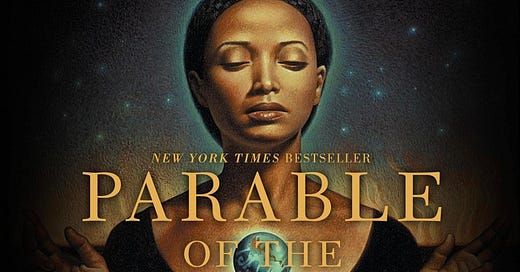When Fiction Becomes Prophecy: Octavia Butler’s Parable of the Sower and the America We Inhabit
Hope Infusion Newsletter • Women’s History Month Edition • March 16, 2025
I have long resisted dystopian fiction. The world we live in feels dystopian enough. But last week a dear sister friend did not suggest that I read Parable of the Sower. She demanded it.
I trust her instincts. Sci-fi is not her typical genre. It’s not mine, either. But she was on fire about this book, about how it mirrors the chaos of our own time, about how its warnings should not be ignored.
So, I pressed play on the audiobook.
I haven’t finished yet, but I don’t need to finish in order to pen these thoughts. Octavia Butler’s vision is already clawing at me based on what I’ve heard thus far, shaking me awake in ways I did not expect. It is impossible to listen without seeing the reflection of the world we are living in—the violence, the political extremism, the environmental collapse, the unraveling of democracy in real time.
Butler didn’t write this novel as prophecy, yet it reads like one.
As we move through Women’s History Month, I want to turn the focus to her—a woman who wrote not just to entertain, but to warn, to guide, and to prepare us for the world that was coming.
Octavia Butler’s Prophetic Imagination
Born in 1947, Octavia Butler was a Black woman navigating a literary world that had little space for her. Science fiction—dominated by white men—was an unlikely genre for someone like her. But she saw in it something powerful: a place to imagine not just the future, but what it means to survive it.
Butler wrote not about distant galaxies or alien invasions, but about us—about the systems of power, greed, and fear that govern humanity. She understood something fundamental: the future is shaped by the choices we make now.
Her 1993 novel Parable of the Sower imagined a United States unraveling under the weight of climate disaster, economic collapse, corporate greed, and a fundamentalist, power-hungry political leader. It was set in 2024.
The parallels to our present moment are unsettling.
When Fiction Becomes Reality
In Parable of the Sower, society is breaking down. The rich retreat behind walls, while those outside fight for survival. Water is more expensive than gas. The government is powerless or corrupt. Violence is rampant. A far-right political leader rises to power, promising to restore order through Christian nationalism.
Sound familiar?
Butler wrote these words in the early 1990s, yet they feel less like fiction and more like an explanation of the news cycle. She saw the widening gap between the rich and the poor, the growing instability of the climate, the dangers of unchecked corporate power, and the way authoritarianism disguises itself as a return to “traditional values.”
She also saw something else: The necessity of adaptation.
The novel’s protagonist, Lauren Olamina, does not seek to restore the past—she knows it is gone. Instead, she creates something new. She founds a belief system, Earthseed, centered on the idea that “God is Change.” Instead of clinging to a broken world, she teaches people to prepare, adapt, and evolve.
And maybe that’s the real warning in Butler’s work: The old world is crumbling. The question is, what will we build in its place?
Parting Thoughts: A Legacy We Can’t Ignore
Octavia Butler didn’t live to see 2024. She died in 2006, long before the crises she predicted became our daily reality. But she left us with a blueprint for survival, a warning wrapped in a novel, a call to pay attention.
Her work reminds me of something I often say: “I’ve learned to surrender to mystery when certainty is elusive, and certainty is often elusive.”
We do not know what comes next. But what we do know is this: ignorance is not an option. Indifference is not survival. And hope? Hope is not passive—it is built, shaped, and carried forward by those who refuse to look away.
Butler looked at the world and dared to imagine what could be saved and what had to be left behind. Maybe the question we should be asking is: Are we brave enough to do the same?
With resilience,
Olivia





